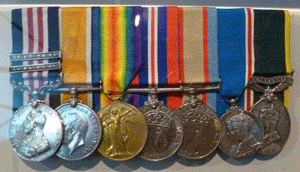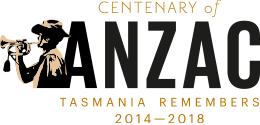Private James Bruce McCulloch MM
A unique place in military history for a young private from Tasmania’s north-west
Great bravery under fire earned Private James Bruce McCulloch a Military Medal (MM) with two Bars following his courageous efforts on the Western Front.
Private McCulloch, from Tasmania’s North West, was one of only two Australian soldiers to have been recommended for a MM on three occasions. Running messages through dangerous zones under enemy fire on the Western Front earned Private McCulloch the MM.
Private McCulloch’s first recommendation for a Military Medal was on 18 April 1917. During an enemy attack at dawn on Lagnicourt on 15 April 1917, Private McCulloch volunteered to run messages many times by passing through a dangerous zone swept by sniper and machine gun fire, in order to get messages to Company headquarters. The attack at Lagincourt resulted in Lance Corporal Blackman and Private McCulloch being the only troops at their post. They hung on until ordered to retire when they had to fight their way back through the enemy at the rear of them.
Private McCulloch again displayed great gallantry and determination in running messages under heavy machine gun fire and shellfire during operations east of Bullecourt from 4 to 8 May 1917. On 6 May he joined a counter attack in repelling the enemy. On 15 May 1917 Private McCulloch was recommended for a Bar to his Military Medal.
Private McCulloch’s courage as a runner at Meteren on the 23/24 April 1918 also saw him recommended for a Bar to the Military Medal on 29 April 1918. Private McCulloch ran messages under heavy fire from the front line to Company headquarters and made trips to the frontline while carrying a box of 1 000 rounds of S.A.A. The box was urgently needed to enable counter attacks later in the day.
Like many young men of the era, James McCulloch, was keen to enlist. However, his parents felt differently and prevented James from joining up. It was not until James’ uncle, Andrew McCulloch, enlisted and offered to take care of his 19-year-old nephew that the two enlisted at Claremont, Tasmania, on 10 September 1915.
On 5 January 1916 James and Andrew McCulloch left Australia and arrived in France where they joined the 12th Battalion on 4 April 1916.
Although Private McCulloch is described as a survivor of the Western Front for having served four years and 127 days, he was wounded twice and admitted to hospital with tonsillitis on two occasions and with scabies on three occasions.
Private McCulloch returned to Australia on the Port Denison on 13 November 1919.
After his discharge from the army in 14 January 1920, Mr McCulloch joined the 22nd Light Horse Ulverstone Troop and became a Sergeant. During this period he also farmed at Abbotsham in Tasmania’s North West. He married Bernice Tongs in 1921 and had three children, Dorothy, Jim and Dale. He remained with the Light Horse until he joined the permanent forces in 1939.
During World War Two James McCulloch was promoted to Warrant Officer first class and awarded the Efficiency Medal in 1944. Most of his service in World War Two was as a Regimental Sergeant Major at Anglesea Barracks, in Hobart. He retired in 1949 due to illness related to mustard gas exposure in France.
Between the wars, Mr McCulloch was honoured to be one of five Tasmanian members of the Australian military contingent at the coronation of King George VI, from whom he received a Coronation Medal from the newly crowned King.
James Bruce McCulloch died in the Repatriation Hospital, in Hobart on 2 August 1966.



